It takes the average person almost three hours to walk five miles.
This time can fluctuate depending on several factors — the terrain, the weather, the age and fitness level of the person walking and the weight of whatever they might be carrying.
Women from the rural Ntumburi community in Meru, Kenya, had been traveling almost five miles to reach the nearest health clinic for prenatal and postnatal services. Carrying their babies in either their bellies or in their arms, they walked a daunting journey over dusty and hilly terrain. Paying for transportation — a cost of almost $3 — was not a luxury that most could afford.
Faced with these options, many expectant and new mothers couldn’t make the journey at all, leaving their children at risk against vaccine-preventable diseases, sometimes resulting in death.
Despite progress in routine immunization coverage, it’s a story that continues to play out across Africa. According to the World Health Organization, more than 30 million children under the age of five in the region suffer from vaccine-preventable diseases, and there are over 500,000 deaths, which account for 58% of global mortality from these diseases.
In the Ntumburi community, a health dispensary had existed since 2015. But the facility lacked electricity, limiting the types of services it could offer to the community, including vaccinations.
In 2024, an Unbound mothers group from Ntumburi united with the goal of making their community a healthier place for all. In just one month, their leadership and determination, combined with the support of a generous donor seeking to honor the memory of his late wife, changed the face of health care for expectant mothers and children in their community.
August 14, 2025 | Agents of Change
'Blessings' for her memory
Donor's support of Agents of Change proposal leads to improved postnatal care for thousands of mothers and infants in Kenya.
By Kati Burns Mallows
A mothers group called 'Blessings'
The Unbound Meru program serves six communities across Meru and over 5,700 sponsored individuals and their families.
The Ntumburi community is a rural community that consists of 2,000 to 3,000 households largely dedicated to subsistence farming. Over 960 sponsored individuals live in or near the Ntumburi community including Mercy, who is the mother of sponsored child Bravin.
Mercy is the treasurer of her Unbound mothers group called the “Baraka self-help group.” In Swahili, “Baraka” means “blessings.”
Unbound mothers groups are comprised of the parents and guardians of sponsored children, largely mothers, who are empowered to drive meaningful change within their families and communities. One of the platforms they use to improve their communities is Unbound’s Agents of Change that empowers them to identify a need, craft a proposal for aid, and then have that proposal displayed on the Unbound website for selection and funding by a donor. The year 2024 was the first full year that Agents of Change proposals were implemented in all countries where Unbound has a presence.
When the Agents of Change platform became available to Mercy’s mothers group in Meru, they knew exactly what their community needed most. Though the dispensary in Ntumburi had recently received funding to install electricity, the center still lacked necessary equipment that would allow them to properly service their community.
“One of the mothers here couldn’t afford the transport costs to the distant hospital facility to get her infant vaccinated and the child’s health had [deteriorated],” Mercy said. “Some women were walking almost five miles [for vaccinations available in other communities]. We had to listen and get help for our mothers and infants.”
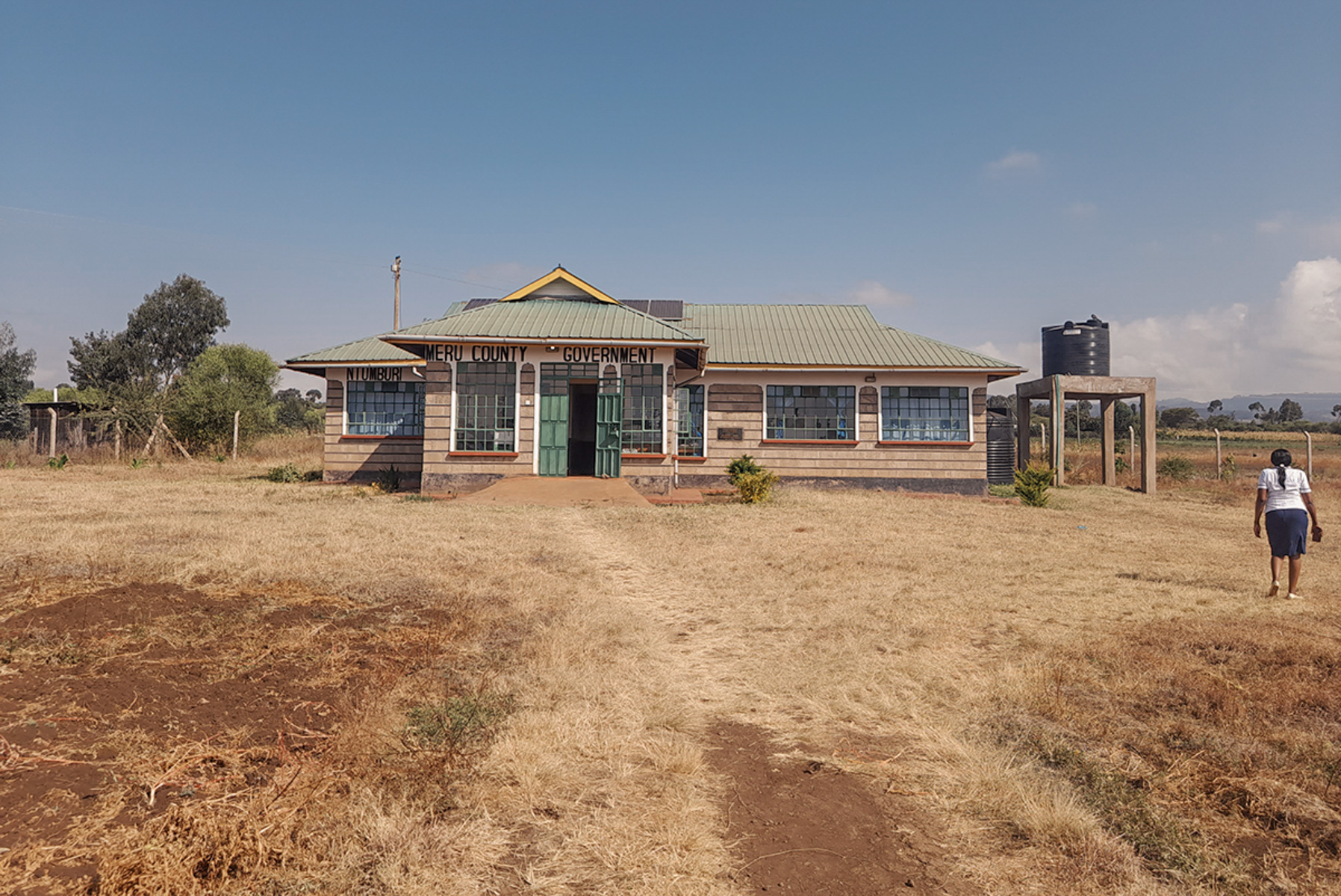
The Ntumburi dispensary in rural Meru was without electricity for several years, limiting what services they could offer their community, including vaccinations for expectant mothers and children.
Immunization can prevent a wide range of infectious diseases. Children who have never received a single vaccine or are under-immunized and remain highly vulnerable are often referred to as “zero-dose children.” According to UNICEF, one out of every 10 children in Kenya remains unvaccinated, while 3% have not received their first dose of DTP vaccine (a combination vaccine administered to children under age seven to protect against three serious diseases: diphtheria, tetanus and whooping cough).
Beatrice Mwendwa is one of two nurses who works at the Ntumburi dispensary. They see between 20-25 patients per day treating illnesses and offering family planning services. The dispensary couldn’t offer vaccinations because they had nowhere to properly store vaccines, which must be kept at particular temperature ranges depending on the vaccine type. With a less vaccinated population, Mwendwa often treated individuals with serious upper respiratory tract infections, and tuberculosis. Recently, two cases of measles have been confirmed in Meru.
“We were trying to help educate our patients on the importance of vaccinations, and they were trying to adhere to the regimes of vaccination,” Mwendwa said.
But the process was often even more complicated for the fact that even the neighboring health dispensaries Ntumburi community members traveled to would run out of vaccinations.
A 2025 research paper in Discover Public Health found that factors affecting access to vaccination services in Africa had more to do with “supply-side” problems compared to “demand-side” issues and called for policy makers and health authorities to reimagine current vaccination service delivery models through an equity lens in Africa.
The study argued that the term “hard-to-deliver” was more appropriate when referring to vaccination services as opposed to using the term “hard-to-reach populations,” which is often used to describe communities that are difficult to reach for services on account of geographic, social or economic circumstances. According to the Africa CDC, Africa currently produces less than 1% of the vaccines it uses, a challenge Africa CDC is working to improve.
With guidance from Unbound staff and input from nurses at the Ntumburi dispensary, Mercy and her mothers group — comprised of 29 parents — set to work writing a proposal for an initiative that would improve vaccination access in their community with the purchase of a certified vaccine refrigerator.
At the local level, Mercy’s mothers group proposal was reviewed by a selection committee — also made up of mothers. Viable proposals are then uploaded to a digital portal where they are eventually listed on Unbound’s website for donors located anywhere in the world to select.
Now all that the “Blessings” self-help group needed was the perfect donor to believe in their Agents of Change initiative and their potential to make their community a healthier place for all.
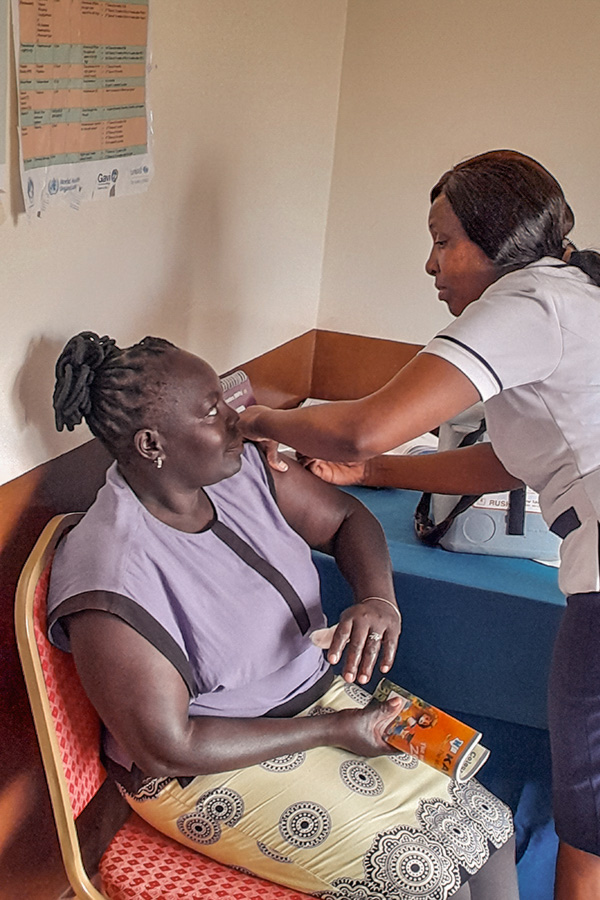
At the Ntumburi dispensary, Nurse Beatrice Mwendwa administers services to Diana, the mother of an Unbound sponsored child and who is part of the “Blessings” self-help group in Meru.
To make Margot smile — An initiative benefitting the largest number of people
Over the course of 22 years, Dan and Margot (first names only are being used to honor the donor's request for privacy) had sponsored more than 10 children and elders through Unbound.
The couple met at a part-time job while Margot was in high school and Dan was in college and got engaged at Margot’s high school prom. They had careers in the accounting industry and raised two sons.
For them, sponsoring and giving were often tied to personal reasons. After their own children were grown, they sponsored mostly girls through Unbound because they knew women in developing countries often had even less opportunities than men. When both Dan and Margot’s parents passed, to honor their memory, they began sponsoring two elders, one who shared Margot’s birthday.
The couple had made retirement plans, but not long after retiring in 2022, Margot was diagnosed with an aggressive form of brain cancer. Just 20 months after her diagnosis and at the age of 64, Margot passed away.
Those closest to Margot said that her “superpower” was love and relationships. It was her wish after she died that, in lieu of flowers at her funeral, attendees donate to a project in her community to build a splash pad for children.
“She had a really big heart,” Dan said. “She loved people, loved children. She just loved supporting organizations that helped people in need, but particularly women and children.”
May 2024 brought Mother’s Day and what would have been Dan and Margot’s 45th wedding anniversary. Dan felt he needed to do something to honor the memory of his wife. When he saw mention of Agents of Change in Unbound’s monthly eNews, an idea took shape.
He perused Agents of Change proposals available for funding on the Unbound website. There were proposals for communities throughout Africa, Asia and Latin America seeking support for such things as solar streetlight installation, stairway construction, schoolhouse renovations and more.
Dan’s criteria were simple: He wanted to fund an initiative that impacted the largest number of people, but that especially benefited women and children.
“I tried to find projects that I knew she [Margot] would appreciate, things that I felt had a personal connection to me and that I hoped would make my wife smile up in heaven knowing that we did some good,” Dan said.
Using his donor advised fund, Dan selected proposal AC303 for funding, which was the Blessings self-help group’s proposal for a vaccine refrigerator for their community clinic in Meru. With a funding request for $1,725, once complete, the initiative would have an estimated benefit to 2,000 families.
I tried to find projects that I knew she [Margot] would appreciate, things that I felt had a personal connection to me and that I hoped would make my wife smile up in heaven knowing that we did some good.
— Dan, Unbound Sponsor/Donor
Change and blessings beyond measure
Since Unbound Agents of Change proposals became available for funding directly from the website in 2024, over 1,800 initiatives have been funded by donors, 80 of those in Meru, Kenya.
Initiatives that improve education, road infrastructure, water access and community progress are the most popular selected for funding each year. However, initiatives that are health-related result in the highest number of impacted families or, rather, their impact is wider spread.
Within one month of receiving the Agents of Change grant and working with the local health team to identify the equipment needed, Mercy’s mothers group had purchased and installed a Haier Biomedical vaccine refrigerator at Ntumburi dispensary.
Mercy said that the greatest thing the Blessings self-help group learned during the initiative was how to work together to accomplish their goals.
“If not for togetherness, we would not have achieved getting the fridge in our clinic,” Mercy said. “We are [proud] that we did a good thing that will [leave] a legacy in our community.”
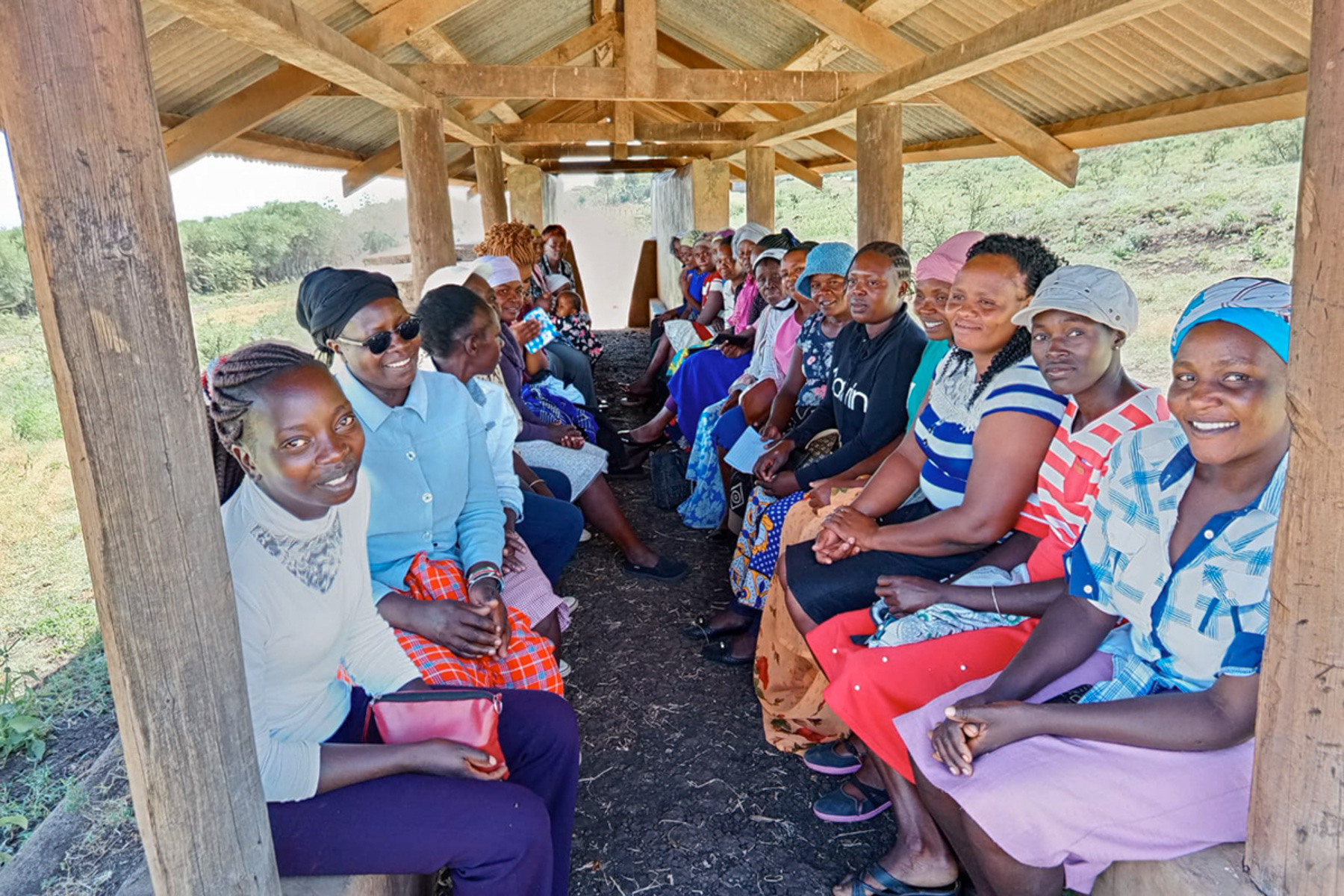
Members of the “Blessings” self-help group in Meru, which includes mostly the mothers of sponsored children.
Since getting the vaccine refrigerator into operation, the Ntumburi dispensary has been able to offer a wide range of all vaccinations to their community including vaccines like the BCG (used to prevent tuberculosis and other mycobacterial infections), the tetanus toxoid, and vaccines to prevent COVID-19, measles and typhoid, among others.
“When the community itself has identified their need, they are usually very determined to see the change within their community,” Nurse Mwendwa said. “The mothers came believing that they should get the vaccine refrigerator with whatever it takes, and it was a joy to work with them.”
The Blessings self-help group has taken ownership of the initiative further in that they now make new and expectant mothers to their group aware of the new services offered at Ntumburi dispensary and encourage them to get vaccinated.
According to Nurse Mwendwa, the number of patients visiting the Ntumburi clinic has increased so much that the clinic needs to hire additional staff. She estimates that they now also vaccinate at least two new infants per day who were delivered at neighboring hospitals where a lack of supply kept them from receiving their first vaccinations. In addition, they’ve found that more patients are completing multiple-dose vaccinations on time now that they no longer must travel so far outside of their community for their follow-up visits.
“Accessibility to health services is better and, we are happy to be able to administer immunizations to the babies of this community,” Mwendwa said. “As caregivers, we are really encouraged that by each day, we are getting a healthier community in Ntumburi.”
The ripple effects from making vaccines more accessible in the area has trickled down to result in a few other positive outcomes that were largely unexpected.
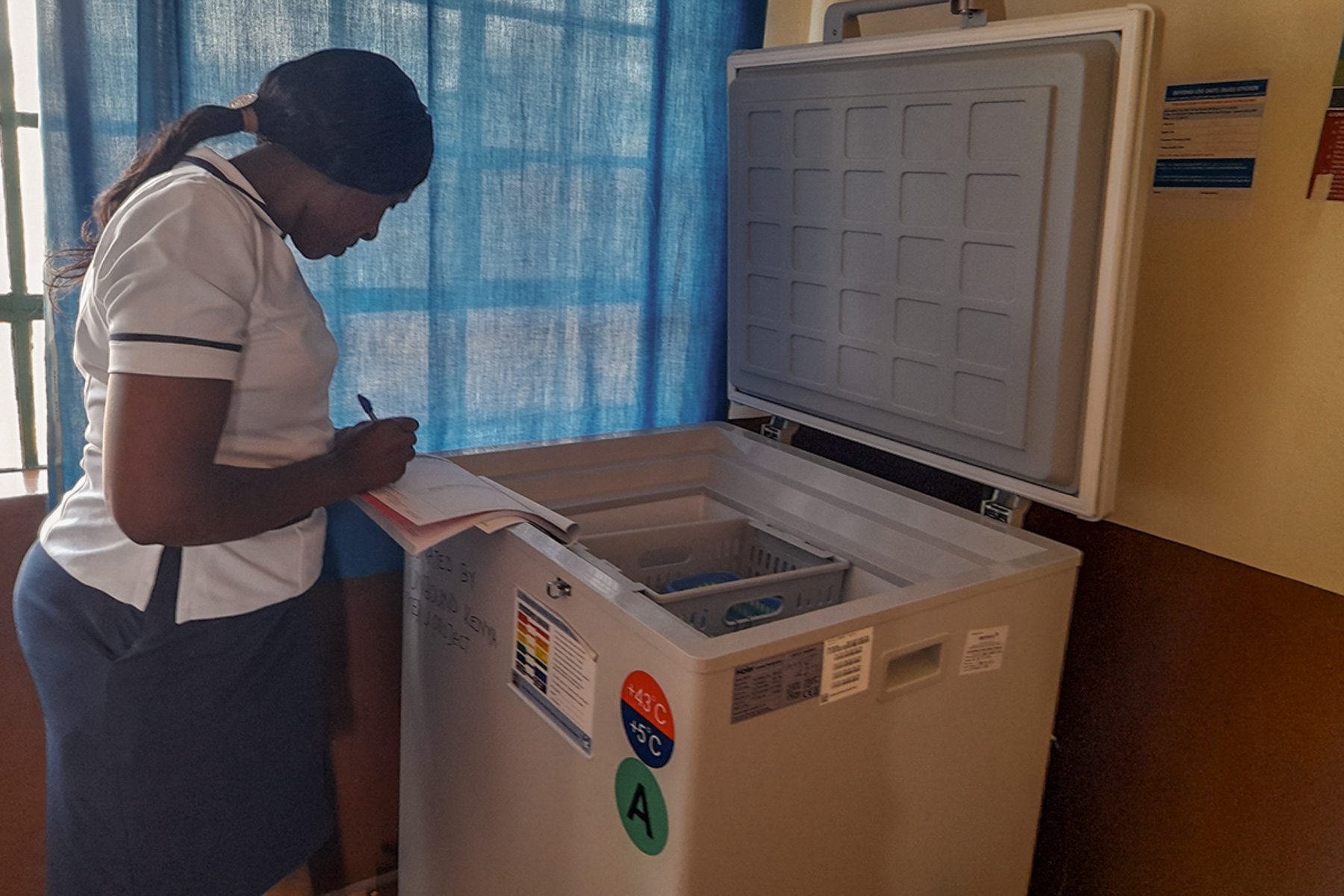
Nurse Beatrice Mwendwa takes daily count of all the vaccines stored in the Ntumburi dispensary’s new Haier vaccine refrigerator.
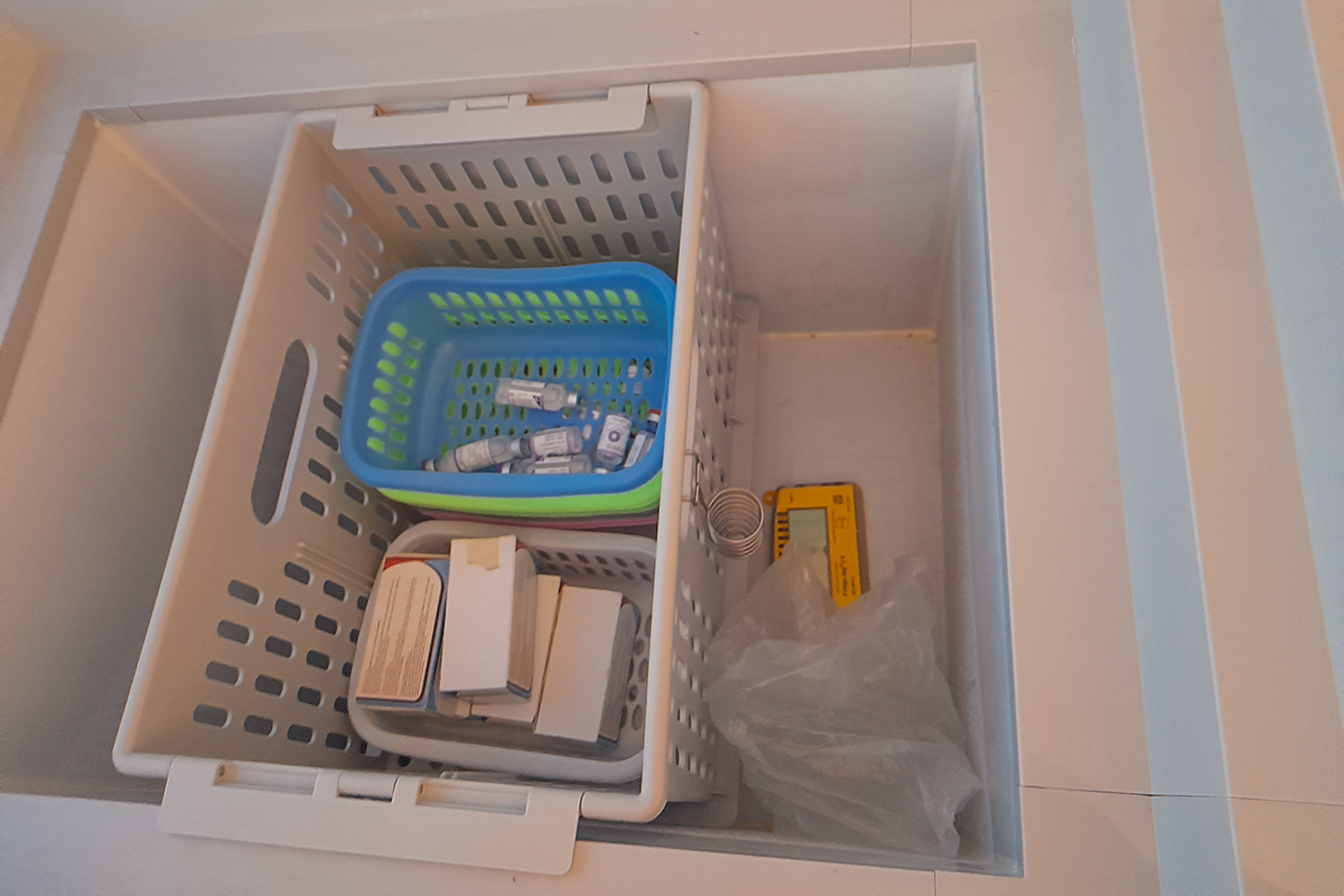
The Ntumburi dispensary can now offer a wide range of vaccines to their community, including basic vaccines to prevent tuberculosis, COVID-19 and measles.
Mwendwa said that school-age children seeking vaccination for enrollment in school now find it less difficult to get the vaccinations needed quickly and, thus, are less likely to miss school time. In addition, when clinics in a neighboring county to Meru run out of their vaccine supplies, the Ntumburi dispensary has begun receiving their patients for vaccinations as well.
Being a rural clinic that now offers immunizations has opened the Ntumburi dispensary and its nurses up to recognition from others within the broader professional medical community in Meru. Mwendwa, who has been a nurse at the Ntumburi dispensary for five years, has even found opportunities to grow her nursing skills.
“Now that we offer everything, we get updates on upcoming vaccination availability and get to participate in activities,” Mwendwa said. “I am gaining new knowledge and get to do refresher courses to learn more about immunizations. We are very proud to be a part of the larger [medical community].”
Mwendwa said that she is hopeful now that the dispensary will also soon be selected by the county government for expansion to include a lab, which would mean they could offer tests to their patients as well. Not surprisingly, when asked what the Blessings self-help group would focus on for their next community improvement initiative, Mercy also said the mothers would work to get a laboratory established at the clinic.
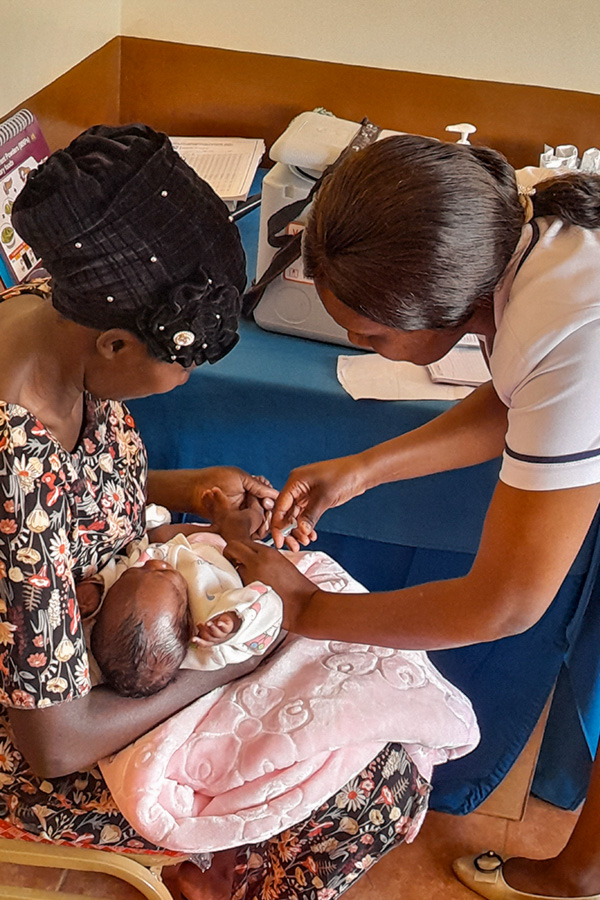
Since adding the vaccine refrigerator and vaccination services to Ntumburi dispensary, Nurse Mwendwa estimates the staff vaccinates two to three new infants per day and sees 20-25 patients from Meru County and surrounding counties.
Accessibility to health services is better and our number of [patients] has increased. As caregivers, we are really encouraged that by each day, we are getting a healthier community in Ntumburi.
— Beatrice Mwendwa, Nurse, Ntumburi Dispensary in Meru
Feedback that brings a sense of closure in more ways than one
Donors who fully fund an Agents of Change proposal receive an outcomes report complete with photos following the completion of the initiative.
Just a handful of months after funding it, Dan was pleasantly surprised to receive an email detailing the outcome of initiative AC303. The feedback not only confirmed to him that he had made the best decision with his donation, but it also offered him a level of closure he hadn’t expected.
“So many times you give money to an organization, and it just goes into a black hole, and you don’t fully understand and appreciate what your money was used for,” said Dan. “I was really gratified to see the report that showed how the investment was made, the ‘thank you’ and the photos of all the people working together. It felt like closure to me.”
Each Mother’s Day now, Dan plans to fund an Agents of Change initiative in his late wife’s memory. In 2025, he funded the improvement of a sports field — motivated by the thought of how much his own grandsons love playing soccer — for a community in Peru in memory of Margot. Her memory fuels him always, and he hopes she’s pleased he’s chosen this way to honor her.
“I think she’d be happy with how [the benefit] from these initiatives have multiplied,” Dan said. “I hope she feels that we did good. It feels like her life is rippling out and having a positive impact.
“If something positive can come out of this whole terrible experience of losing her, then let this be a part of that.”
Unbound Regional Reporter Nickson Ateku and Unbound Meru staff contributed information and photos for this story.